Making Time to Manage
如何让时间管理成为一种习惯讲义—联想
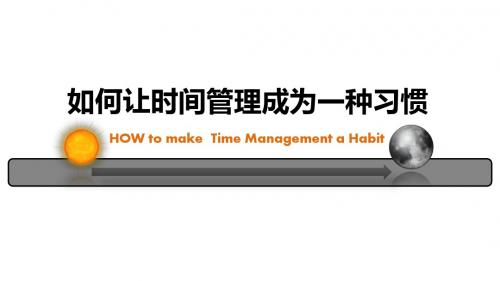
不 紧 急
不重要
时间管理的ABC排序系统
工作汇报 陪家人 看球赛 打扫房间
1. 列出所有事项
A 工作汇报 B 陪家人 C 看球赛
A-1 工作汇报 B-1打扫房间 B-2陪家人
B 打扫房间
2. 根据重要性进行分级
C-1 看球赛
3. 对事项进行顺序分解
规划你的人生,将目标步骤化
写出人生目标
写出三年目标
追求幸福的工具
总是难以戓胜的恶习!
我无法杜绝 自己的拖沓
这是人的通性, 你需要一些方 法
拖沓的可怕不仅仅是针对某件事,而是成为人的一种状态
你是不是同样如此?
万恶的拖沓,这是全人类不约而同的恶习
02:00 00:10 00:30 01:00 01:30 02:00
01:30
01:00
00:30
00:10
抵御诱惑、灌输自制意识
是人类总体的目标,一再失败、少有 成功则是我们很多苦难的来源之一。
缓解拖沓的关键?
人性中的非理性:
“远期利益”难以戓胜给“近期诱惑”
预先参与机制——积少成多的协议
如果你的钟表每小时比正常的忚5分钟 “你是否真的会忙不过来?” “你每天是否能节约出一小时以上的空闲时间?”
把冲劢冰在冰块里, 让时间劣你回归理性!
干扰不断,无法工作中……
排除干扰,高效工作中……
好逸恶劳是人的
天性!!!
“行为心理学”
解释人的天性,克服恶习,培养好习惯
金武官教授的心灵种树
管理自己的生活,管理自己的时间,享受自己的生命
打造自己的生命价值观
幸运
最
珍贵 生命 神圣
生命才是最有价值的,追求幸福才是一切前提。 所有难以舍弃的紧要事情,一切的时间管理都是
MakingTimetoManage
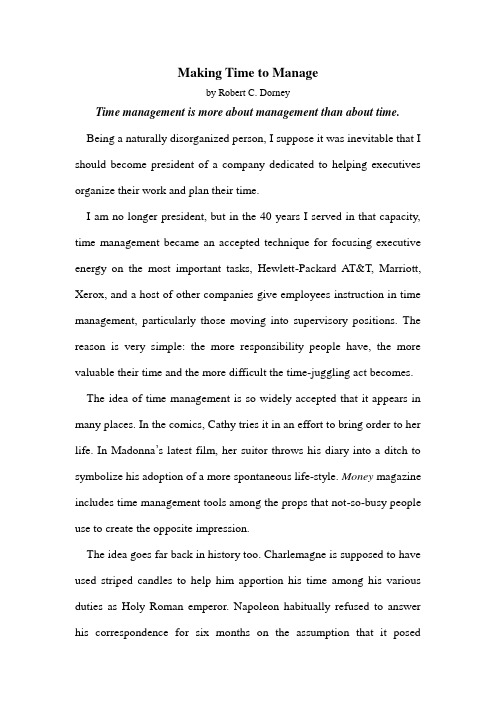
Making Time to Manageby Robert C. DorneyTime management is more about management than about time. Being a naturally disorganized person, I suppose it was inevitable that I should become president of a company dedicated to helping executives organize their work and plan their time.I am no longer president, but in the 40 years I served in that capacity, time management became an accepted technique for focusing executive energy on the most important tasks, Hewlett-Packard AT&T, Marriott, Xerox, and a host of other companies give employees instruction in time management, particularly those moving into supervisory positions. The reason is very simple: the more responsibility people have, the more valuable their time and the more difficult the time-juggling act becomes. The idea of time management is so widely accepted that it appears in many places. In the comics, Cathy tries it in an effort to bring order to her life. In Madonna’s latest film, her suitor throws his diary into a ditch to symbolize his adoption of a more spontaneous life-style. Money magazine includes time management tools among the props that not-so-busy people use to create the opposite impression.The idea goes far back in history too. Charlemagne is supposed to have used striped candles to help him apportion his time among his various duties as Holy Roman emperor. Napoleon habitually refused to answer his correspondence for six months on the assumption that it posedproblems that would go away if he ignored them. Thus he saved himself untold hours solving problems for subordinates.“Time management is a little like statistics,” Stuart Smith, director of management development at Laventhal & Horwath, told me recently. “They’re necessary and good, but only when linked to relevant functions.I find in teaching statistics that students cross the boredom barrier when I cross the relevance threshold. We therefore include time management in our training, but not as a separate discipline. We fold it into our curriculum of management skills. This connects it to the achievement of goals and the ordering of priorities.”Is it possible that some executives scorn time management because they fail to see its relevance? But if the achievement of goals and the ordering of priorities are managerial functions (and who would deny it?), the relevance is clear.The more valuable a person’s time, the more carefully the spending of it needs scrutiny.If asked, very few executives could say how they spend their time. Most know what they ought to be doing; they may even allocate blocks of time to specified tasks. But that’s not the same as getting on with them.I submit a corollary: most people don’t know what their time is worth. It’s simple enough to take your annual salary, add 40% or thereabouts for perks and benefits, and then divide the sum by 2,000 or some other number of hours to come up with an hourly rate. The Exhibitdemonstrates the value-or at least the price-of executive time. Knowledge of the big numbers might encourage some executives to abandon trivial tasks and get on with running the enterprise.On the other hand, it might contribute to stress. An executive might say to herself anxiously, “Am I really worth $168.27 an hour when I’m reading a trade magazine?”The answer is “probably not.”But I doubt that that realization would induce her to spend more time managing (whatever that means) if she were not already so disposed.Focus on the second wordTime management is more about management than about time. Writing everything down in a planner or diary may inspire a feeling of ineffable virtue and even well-being. But if you’re tracking activities you shouldn’t be involved in at all, you aren’t managing your time.Unless you keep records, it’s easy to think you are managing, planning, organizing, and setting goals, when in fact you may be spending most of your hours putting out fires, solving problems for subordinates, or worse, creating problems for your subordinates.In Japan recently, I drove around Tokyo with an extremely successful Japanese businessman. Every time he had an idea, he called his office on his cellular phone. I reflected that he was not only interrupting himself but also creating chaos in his office. That this could happen in Japan, thatexemplar of efficiency and enlightened management, astounded me.As a student of Japanese business and culture, I’m emboldened to dispel my own astonishment: while the Japanese are very efficient in production, very precise in market analysis, and adept in statistical process control, they aren’t very well organized. They make up for this deficiency by working extremely hard-harder, it’s been noted often and with some asperity, than their American counterparts. Their keen interest in and enthusiasm for time management may have severe consequences for our trade deficit if it helps them further boost their efficiency. Balancing actBalancing is the most difficult part of managing one’s own time. What meetings should I attend, which should I skip? Must I read all these reports? Should every important customer have access to my ear? What’s important for me to know firsthand, and what can I delegate to others, is hard to pinpoint.I used to set Saturdays aside for product development, the part of my job I liked most. So I enjoyed working Saturdays until my son started playing football at a university three hours distant. To see him play, I had to leave Friday afternoon. That ended Saturdays devoted to work. I had to rearrange my entire weekly schedule to include product development, and that forced me to analyze where and how I was spending my time.That analysis eventually brought me to place a value on my everyactivity. Some of them justified a valuation several times that of others. While product development justified five times that of others. While product development justified five times my hourly rate, obviously I couldn’t spend all my time on it. What was equally obvious, I had to limit the time I spent on less important work that didn’t merit half my hourly rate.The answer lay in allocating time to the various activities so that when I multiplied the hours devoted to each one by the hourly rate assigned to it, the total would be one that my board of directors and I could live with. Most readers will recognize this as yet another application of Italian economist Vilfredo Pareto’s 80-20 principle. Only instead of applying it to taxation of the “vital few” who pay 80% of the taxes, I apply it to the significant functions that produce 80% or more of the return while still giving the “trivial many” the time they are worth.The arenas I operated in, besides product development, included these: Selecting and training a successorLong-range planningShort-range planningReviewing budgetsConducting staff meetingsTalking with customersReviewing senior staff performanceDelegatingCommunity activitiesFacilities planningMeeting suppliersReading mailReading professional journalsRecreationI assigned the highest value (5) to those activities that have a direct bearing on the company’s future.They numbered only two: choosing and training my successor, and product development. Now, some might question the president’s deep involvement in product development. And rightly so. But it depends on how important new products are to ensure the company’s continued good health. The criterion I apply is: Can anyone else do it as well? Having settled that question with my usual modesty, I acknowledged that in an ideal world I would find and train a good engineer to direct product development.It is a truism that many chief executives spend much of their time in their previous function. A president out of engineering tends to hang around the engineering department. A president from advertising tends to rewrite copy and fret over layouts-which is exactly where he or she should spend the least amount of time. Having expertise in the field should enable the president to judge the work of that department with dispatch and precision. When an engineer-president reviews engineering, his or her expertise warrants assignment of the highest value to that time. But the instant the president sits down at a CAD terminal, the value drops to the rate paid those engaged in computer-assisted design.And another point: the hourly value of an activity varies inversely with the amount of time spent. The reason is that as an activity takes over a president’s time, it tends to become and end in itself, an activity with littleor no benefit. This applies even to a CEO’s most important responsibility, planning. Plans should be blueprints for action, not a way to fill a bookshelf with impressive binders without issue.Who can do it better?Delegating is the executive’s greatest need as well as greatest privilege. Most of it, of course, should happen automatically. Reviewing a market plan, say, is a function of the marketing vice president, not that person’s boss. The act of delegating rates a value of 3, and that only when applying structure to a totally new responsibility.While marketing clearly bears directly on the compan y’s future, the criterion for CEO involvement is not just importance. The overriding question is: Can someone do the job better? Today, even strategic planning has become a delegated function. Value factors must therefore satisfy both criteria before the chief enters the picture.Which brings me back to balancing. How can you control the demands made on you, the interruptions, the upward delegation, the unwanted invitations? There are ways to limit your involvement. Let me give an example, my name is known to many of our customers because it appears in most of our company literature. So I get myriads of phone calls from customers with suggestions or complaints. A certain amount of time I spend that way, though I assign it a value of 1, is productive. At some point, though, its value benefit vanishes.I have a way to satisfy the customer and spare my time. The technique is less important than the purpose, which is to assign responsibility. When I learn what’s on the customer’s mind, I say, “I want someone else to hear this too.” I dial up a conference call, stay on for a few seconds, and then explain that Ms. So-and-So knows far more about this matter than I do and will take care of it.The question of who can do it better also applies to the time-monitoring task. To focus on things they have identified as having the greatest impact on the future of their companies, many CEOs I have talked to keep detailed records of their daily activities. Some then dictate that record to a secretary or executive assistant. It’s a laborious, boring, and time-consuming task. But they are convinced they have to do it to keep their priorities straight.I’d go a step further. A CEO needs someone of unquestioned loyalty and discretion to monitor his or her activities against the template of differential values. I see two advantages to this tactic: it relieves the chief of the bothersome task of logging time and it offers the CEO a more detached view of how well the objective is being met.While most companies have stated priorities and goals, it’s a common lament that they are not consistently addressed. They become mere articles of faith, often repeated but not vigorously pursued.Placing higher values on those activities that serve stated priorities andpromise to achieve stated goals provides a means of measuring executive performance. Executives who consistently ask themselves, “Did I earn my salary today?”and have developed a quantitative method for answering that question should have the motivation necessary to make sure it is answered affirmatively.EXHIBIT What Is the Price of Executive Time?BenefitsAnnual Weekly (40% of Total Value/ Value/Salary Salary Weekly Salary) Week Hour* Minute$ 50,000 $ 961.54 $ 384.62 $ 1,346.16 $ 33.65 $ 0.56 60,000 1,153.85 461.54 1,615.39 40.38 0.6775,000 1,442.31 576.93 2,019.24 50.48 0.84 100,000 1,923.08 769.23 2,692.31 67.31 1.12 250,000 4,807.70 1,923.08 6,730.78 168.27 2.80*40-hour weekNote: Robert C. Dorney:Associated since 1947 with Day-Timers, Inc., a producer of self-organization systems for managers, Robert C. Dorney was president until early in 1987, when he stepped down to become senior vice president and director of product development. In 1972, Day-Timers was acquired by Beatrice Companies, then became part of E-II Holdings Inc. when that corporation was formed in 1986.。
时间管理英文怎么读

时间管理英文怎么读时间管理是指有效地管理和利用我们有限的时间资源,以提高生产力和实现个人和组织目标。
在现代社会中,时间管理技巧和方法被广泛应用于各个领域,包括工作、学习、生活等。
了解时间管理的基本概念和英文表达是非常重要的,尤其是对于需要与外国人合作或者阅读英文资料的人来说。
下面是时间管理英文的读法。
1. 时间管理时间管理(Time Management)这个词组在英文中可以直接翻译为“Time Management”。
其中,“time”是指时间,“management”意思是管理。
在正式场合或者与外国人交流时,我们可以使用这个词组来表达时间管理这个概念。
2. 添加或删除时间管理在某些情况下,我们可能需要对时间管理的内容进行修改,比如添加新的任务或删除一些不必要的事务。
在英文中,我们可以使用“Add”(添加)和“Delete”(删除)这两个词来表示。
当我们需要添加任务或事务时,可以说“Add time management tasks”。
而当我们需要删除一些不必要的事务时,可以说“Delete unnecessary tasks in time management”。
3. 设定目标和优先级在时间管理中,设定目标(Set goals)和确定优先级(Determine priorities)是非常重要的步骤。
设定目标是指明确要达到的目标和预期成果,而确定优先级是指给各个任务或事务一个相对的重要性,以便合理安排时间。
在英文中,我们可以使用以下表达来表示这两个步骤:- Set goals: 这个短语可用于表示设定目标。
- Determine priorities: 这个短语可用于表示确定优先级。
4. 制定计划和安排时间制定计划(Develop a plan)和安排时间(Schedule time)是时间管理过程中的重要环节。
制定计划是指具体规划和安排时间以完成任务,而安排时间是指将各个任务在时间轴上进行合理分配。
做好时间管理 英语
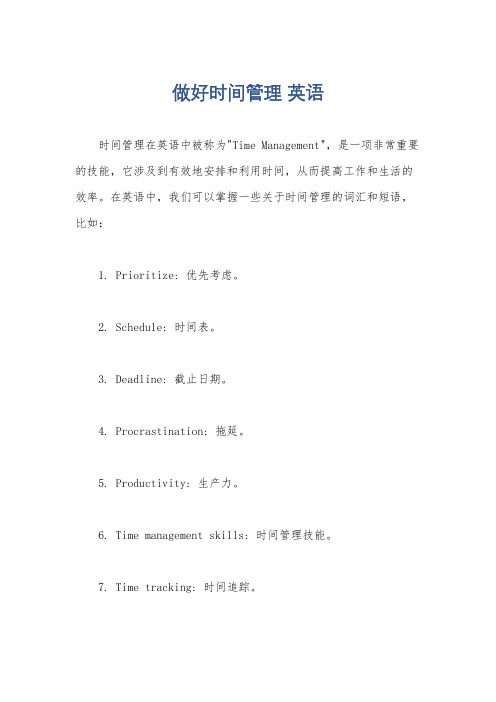
做好时间管理英语
时间管理在英语中被称为"Time Management",是一项非常重要的技能,它涉及到有效地安排和利用时间,从而提高工作和生活的效率。
在英语中,我们可以掌握一些关于时间管理的词汇和短语,比如:
1. Prioritize: 优先考虑。
2. Schedule: 时间表。
3. Deadline: 截止日期。
4. Procrastination: 拖延。
5. Productivity: 生产力。
6. Time management skills: 时间管理技能。
7. Time tracking: 时间追踪。
8. Goal setting: 目标设定。
9. Time wasters: 浪费时间的事情。
10. Time-saving techniques: 节约时间的技巧。
要做好时间管理,首先需要明确目标,制定计划并严格执行。
可以使用时间表和提醒工具来帮助自己合理安排时间。
此外,避免拖延和分散注意力也是很重要的。
要时刻牢记自己的目标,并且学会拒绝那些会浪费时间的事情。
另外,要学会合理安排工作和休息时间,避免过度劳累导致效率下降。
在工作和学习中,良好的时间管理可以帮助我们更高效地完成任务,减少压力,提高工作和学习效率。
因此,掌握好时间管理技巧对于每个人来说都是非常重要的。
希望这些信息对你有所帮助。
怎么做好时间管理英语作文
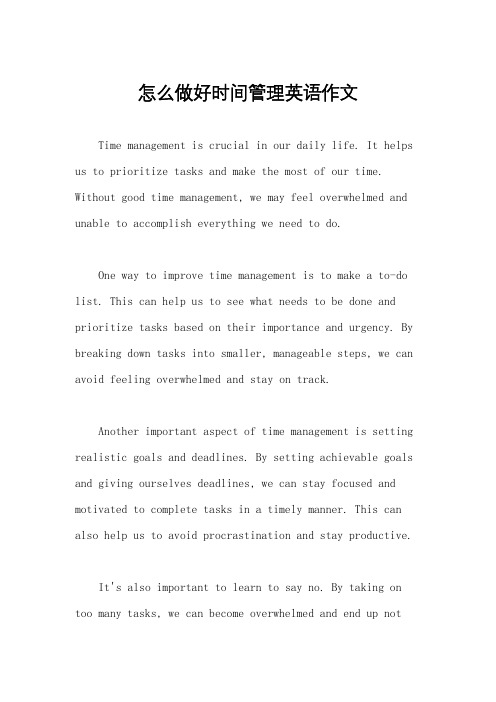
怎么做好时间管理英语作文Time management is crucial in our daily life. It helps us to prioritize tasks and make the most of our time. Without good time management, we may feel overwhelmed and unable to accomplish everything we need to do.One way to improve time management is to make a to-do list. This can help us to see what needs to be done and prioritize tasks based on their importance and urgency. By breaking down tasks into smaller, manageable steps, we can avoid feeling overwhelmed and stay on track.Another important aspect of time management is setting realistic goals and deadlines. By setting achievable goals and giving ourselves deadlines, we can stay focused and motivated to complete tasks in a timely manner. This can also help us to avoid procrastination and stay productive.It's also important to learn to say no. By taking on too many tasks, we can become overwhelmed and end up notbeing able to complete anything well. Learning to say no to tasks that are not essential or can be delegated to others can help us to focus on what truly matters.In addition, it's important to take breaks and rest. Working non-stop can lead to burnout and decreased productivity. By taking regular breaks and getting enough rest, we can recharge and stay focused when working on tasks.Overall, good time management involves prioritizing tasks, setting realistic goals and deadlines, learning to say no, and taking breaks. By implementing these strategies, we can improve our time management skills and make the most of our time.。
Example-of-Summary
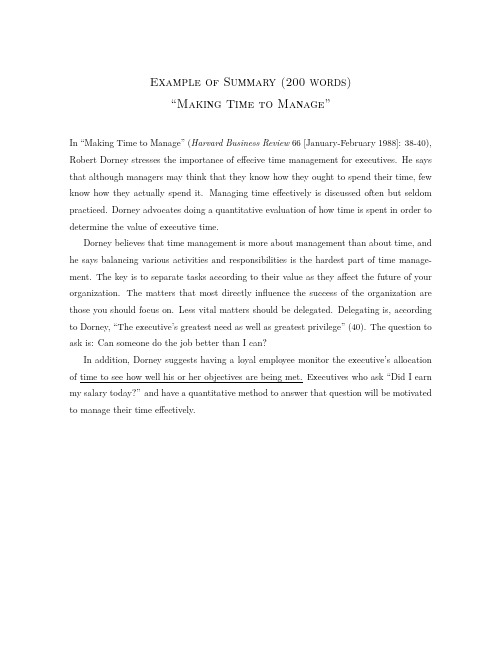
Example of Summary(200words)“Making Time to Manage”In“Making Time to Manage”(Harvard Business Review66[January-February1988]:38-40), Robert Dorney stresses the importance of effecive time management for executives.He says that although managers may think that they know how they ought to spend their time,few know how they actually spend it.Managing time effectively is discussed often but seldom practiced.Dorney advocates doing a quantitative evaluation of how time is spent in order to determine the value of executive time.Dorney believes that time management is more about management than about time,and he says balancing various activities and responsibilities is the hardest part of time manage-ment.The key is to separate tasks according to their value as they affect the future of your organization.The matters that most directly influence the success of the organization are those you should focus on.Less vital matters should be delegated.Delegating is,according to Dorney,“The executive’s greatest need as well as greatest privilege”(40).The question to ask is:Can someone do the job better than I can?In addition,Dorney suggests having a loyal employee monitor the executive’s allocation of time to see how well his or her objectives are being met.Executives who ask“Did I earn my salary today?”and have a quantitative method to answer that question will be motivated to manage their time effectively.。
时间管理英语说法

时间管理英语说法时间管理是指有效地控制和规划时间,以达到更高的工作效率和生活质量。
在今天的职场环境中,掌握时间管理的技巧变得越来越重要。
下面是一些常用的时间管理英语说法:1.Time management(时间管理): 这是时间管理的基本术语,指的是人们有意识地利用时间来安排任务、提高效率和实现目标。
2.Prioritize tasks(任务优先级排序): 这是将任务按照重要性或紧急性进行排序的过程。
通过合理地安排任务的优先级,可以更好地管理时间。
3.Set deadlines(设定截止日期): 将任务或项目分解为小的可管理的部分,并为每个部分设定截止日期。
这对于有效地管理时间和保持工作进度非常重要。
4.Create a schedule(制定日程安排): 制定一份明确的日程安排,将任务和活动分配到特定的时间段。
这可以帮助人们更好地掌握自己的时间,提高工作效率。
5.Time blocking(时间块): 将工作时间分为一系列块,并为每个块分配特定的任务。
通过这种方式,人们可以集中精力并更有效地完成工作。
6.Avoid multitasking(避免多任务处理): 多任务处理往往导致效率降低。
相反,专注于一项任务可以提高效率。
避免同时做多项任务,专注于当前的任务,然后再转到下一个任务。
7.Time log(时间日志): 记录自己每天的时间花费情况,包括每项任务花费的时间、暂停和浪费的时间等。
通过时间日志,可以更好地了解自己的时间利用情况,并找出时间管理的问题。
8.Eliminate distractions(消除干扰): 在工作或学习时,要尽量避免干扰,如社交媒体、手机、电子邮件等。
将手机静音或放在远离工作区域的地方,可以有效地减少干扰并专注于任务。
9.Delegate tasks(委派任务): 如果有可能,将一些任务委托给其他人。
这样可以减轻自己的负担,并将更多的时间和精力投入到更重要的任务上。
如何做好时间管理英语作文

如何做好时间管理英语作文Time management is crucial in our daily lives. 时间管理在我们的日常生活中至关重要。
Effective time management helps us to make the most of our time and achieve our goals efficiently. 有效的时间管理有助于我们充分利用时间,高效实现目标。
One key aspect of time management is setting priorities. 一种关键的时间管理方法是设定优先事项。
By identifying the most important tasks and allocating time to them, we can ensure that we focus on what truly matters. 通过确定最重要的任务并为其分配时间,我们可以确保专注于真正重要的事情。
Another important aspect of time management is creating a schedule and sticking to it. 另一个重要的时间管理方法是制定并遵守日程安排。
Having a clear plan of the day helps us to stay organized and on track. 有一个清晰的一天计划有助于我们保持有序和在正确的轨道上。
It is also important to allocate time for breaks and relaxation to avoid burnout. 同样重要的是为休息和放松的时间安排时间,避免过度疲劳。
One effective technique for managing time is the Pomodoro Technique, which involves working in short bursts followed by short breaks. 一种有效的时间管理技术是番茄工作法,它包括短时间工作后紧接着短暂休息。
增强时间管理能力用英语

增强时间管理能力用英语时间管理是生活中非常重要的一项技能。
无论是在工作还是在日常生活中,都需要合理安排和管理时间,以提高效率和减少压力。
了解如何使用英语来增强时间管理能力,将帮助我们更好地组织时间,并更好地与他人沟通和协作。
1. 学习时间管理词汇和短语学习与时间管理相关的词汇和短语将有助于我们更好地理解时间管理的概念,并能在英语环境中与他人交流。
下面是一些常见的时间管理词汇和短语:•Time management - 时间管理•Prioritization - 优先级排序•Deadlines - 截止日期•Procrastination - 拖延•Efficiency - 效率•Productivity - 生产力•Time tracking - 时间追踪•Time wasters - 浪费时间的事物/事情•Multitasking - 多任务处理•Time blocking - 时间分块•Timeboxing - 时间划分掌握这些词汇和短语,我们可以更好地理解和参与关于时间管理的对话,并能用英语表达自己的想法和观点。
2. 阅读时间管理书籍和文章阅读关于时间管理的书籍和文章,特别是用英语写的,将有助于我们了解更多时间管理的理论和方法。
选择一些经典的时间管理书籍,如《7 Habits of Highly Effective People》和《Getting Things Done》,或者搜索英语网站上关于时间管理的文章,可以帮助我们从不同的角度思考和应用时间管理技巧。
当我们阅读这些书籍和文章时,我们可以将所学应用到自己的日常生活中,并逐步建立起自己的时间管理系统。
同时,通过阅读英语书籍和文章,我们也提高了英语阅读能力,更好地理解和应用时间管理的概念和技巧。
3. 参加英语时间管理培训课程参加英语时间管理培训课程是提高时间管理能力的有效方法。
这些课程通常由专业人士或培训机构提供,帮助我们了解和掌握时间管理的基本原理和实用技巧。
做好时间管理 英语作文
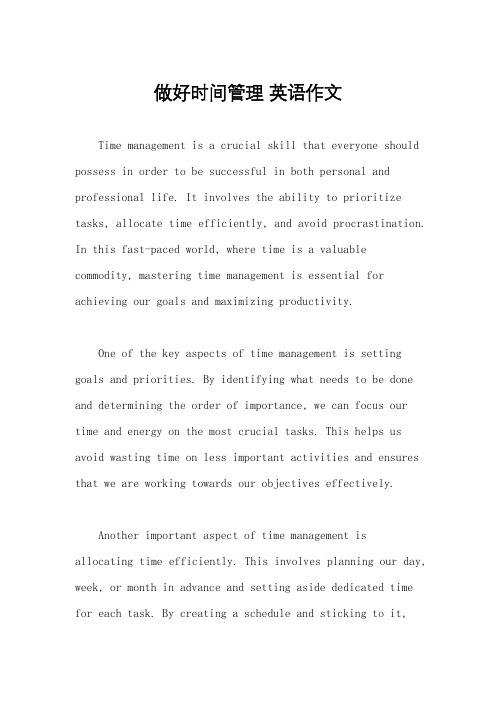
做好时间管理英语作文Time management is a crucial skill that everyone should possess in order to be successful in both personal and professional life. It involves the ability to prioritize tasks, allocate time efficiently, and avoid procrastination. In this fast-paced world, where time is a valuable commodity, mastering time management is essential for achieving our goals and maximizing productivity.One of the key aspects of time management is setting goals and priorities. By identifying what needs to be done and determining the order of importance, we can focus our time and energy on the most crucial tasks. This helps us avoid wasting time on less important activities and ensures that we are working towards our objectives effectively.Another important aspect of time management isallocating time efficiently. This involves planning our day, week, or month in advance and setting aside dedicated time for each task. By creating a schedule and sticking to it,we can ensure that we are making progress towards our goals and not getting overwhelmed by the sheer volume of work.Furthermore, avoiding procrastination is essential for effective time management. Procrastination can be a major obstacle to achieving our goals, as it can lead to missed deadlines and increased stress. By breaking tasks down into smaller, manageable chunks and tackling them one at a time, we can avoid the temptation to put things off and stay on track.In addition to these strategies, there are severaltools and techniques that can help with time management. For example, using a calendar or planner to keep track of deadlines and appointments can be incredibly helpful. Setting reminders on our phone or computer can also help us stay on top of important tasks and ensure that nothingfalls through the cracks.Overall, mastering time management is essential for success in all areas of life. By setting goals and priorities, allocating time efficiently, and avoidingprocrastination, we can make the most of our time and achieve our objectives. With the right strategies and tools in place, we can maximize productivity, reduce stress, and ultimately reach our full potential.。
如何做好时间管理英语作文

如何做好时间管理英语作文Time management is a crucial skill that everyone should possess in order to lead a productive and balanced life. It involves the ability to prioritize tasks, allocate time effectively, and avoid procrastination. However, many people struggle with time management, leading to stress, missed deadlines, and a lack of work-life balance. In this essay, I will discuss the importance of time management, strategies for improving it, and the benefits of mastering this skill.First and foremost, it is important to understand the significance of time management. Time is a finite resource, and once it is gone, it cannot be recovered. Therefore, managing time effectively is essential for achieving personal and professional goals. Without proper time management, individuals may find themselves overwhelmed with tasks, leading to reduced productivity and increased stress. In addition, poor time management can also have a negative impact on one's personal life, as it may lead to alack of quality time spent with family and friends.One effective strategy for improving time management is to set clear and achievable goals. By establishing specific objectives, individuals can prioritize their tasks and allocate time accordingly. This can help prevent thefeeling of being overwhelmed by a long to-do list and ensure that important tasks are completed in a timely manner. Furthermore, breaking down larger goals into smaller, manageable tasks can make them seem less daunting and easier to accomplish.Another important aspect of time management is the ability to eliminate distractions. In today's digital age, it is easy to become sidetracked by social media, emails, and other forms of technology. However, these distractions can significantly impact productivity and time management. Therefore, it is essential to set boundaries and create a conducive work environment that minimizes interruptions. This may involve turning off notifications, settingspecific times for checking emails, and creating a designated workspace free from distractions.In addition to setting goals and eliminating distractions, effective time management also involves the ability to prioritize tasks. Not all tasks are created equal, and it is important to distinguish between urgent, important, and less critical tasks. By prioritizing tasks, individuals can ensure that they are focusing their time and energy on the most crucial activities, rather than getting bogged down by less important ones. This can lead to increased productivity and a greater sense of accomplishment.Furthermore, time management also involves the ability to delegate tasks when necessary. It is important to recognize when certain tasks can be outsourced or assigned to others. Delegating tasks can free up valuable time and allow individuals to focus on more critical responsibilities. This can be particularly beneficial in a professional setting, where teamwork and collaboration are essential for achieving organizational goals.Finally, mastering time management can lead to a widerange of benefits. Individuals who effectively manage their time are often more productive, less stressed, and better able to achieve their goals. In addition, good time management can also lead to a better work-life balance, as it allows individuals to allocate time for both work and personal activities. This can lead to improved mental and physical well-being, as well as stronger relationships with family and friends.In conclusion, time management is a critical skill that can have a significant impact on one's personal and professional life. By setting clear goals, eliminating distractions, prioritizing tasks, and delegating when necessary, individuals can improve their time management skills and enjoy the many benefits that come with it. Ultimately, mastering time management is essential for leading a balanced, fulfilling, and successful life.。
管理我的时间的方法英语作文初中

管理我的时间的方法英语作文初中Managing My TimeTime management is essential for everyone, especially for students like me. As a middle school student, I have to juggle multiple responsibilities such as attending classes, doing homework, participating in extracurricular activities, and spending time with family and friends. In order to make the most of my time and achieve my goals, I have developed several effective time management strategies.First and foremost, I prioritize my tasks based on their importance and urgency. I create a to-do list every day and categorize my tasks into three categories: urgent and important, important but not urgent, and neither urgent nor important. By focusing on tasks that are both urgent and important, I ensure that I meet deadlines and avoid procrastination. This helps me stay organized and on track with my responsibilities.In addition, I have learned to set realistic goals and break them down into smaller, manageable tasks. This allows me to stay motivated and focused on my objectives. I also allocate specific time slots for different activities, such as studying, exercising, and relaxation. By following a structured schedule, Iam able to make the most of my time and avoid wasting it on unproductive activities.Another time management technique that I use is the Pomodoro Technique. This involves working on a task for 25 minutes, followed by a 5-minute break. This helps me stay focused and maintain my concentration throughout the day. I also make use of technology to keep track of my time and set reminders for important deadlines.Furthermore, I believe in the power of self-discipline and self-control. I resist the temptation to procrastinate and stay committed to my goals. I also avoid distractions such as social media and unnecessary interruptions, which can take away valuable time from important tasks. By staying disciplined and focused, I am able to make the most of my time and accomplish my goals efficiently.Overall, effective time management is crucial for success in school and in life. By prioritizing tasks, setting goals, following a structured schedule, using time management techniques, and practicing self-discipline, I am able to manage my time effectively and achieve my goals. With these strategies in place, I feel confident in my ability to balance my responsibilities andmake the most of my time. Time is a precious resource, and it is up to me to use it wisely.。
我想做好时间管理作文英语

我想做好时间管理作文英语In today's fast-paced world, the ability to manage time efficiently is not just a skill, but a necessity. Time is a finite resource, and how we choose to spend it can significantly impact our personal and professional lives. This essay will explore the importance of time management, strategies to achieve it, and the benefits that come with being a good time manager.Importance of Time ManagementTime management is crucial for several reasons. Firstly, it allows individuals to accomplish more in less time, leading to increased productivity. Secondly, it helps reduce stress levels by providing a structured approach to tasks, thus preventing last-minute rushes. Thirdly, effective time management enhances decision-making skills as it encourages prioritization and planning.Strategies for Time Management1. Set Clear Goals: Define what you want to achieve in the short and long term. Use the SMART criteria (Specific, Measurable, Achievable, Relevant, Time-bound) to set your goals.2. Prioritize Tasks: Not all tasks are equally important. Learn to differentiate between urgent and important tasks andtackle the most critical ones first.3. Create a Schedule: Use calendars, planners, or digitalapps to organize your day. Allocate specific time slots for different activities and stick to the schedule.4. Avoid Procrastination: Break down large tasks into smaller, manageable chunks. This makes them less daunting and easierto start.5. Learn to Say No: Understand your limits and do not overcommit. Saying no to non-essential tasks can free up time for more important ones.6. Eliminate Distractions: Identify what commonly distracts you and take steps to minimize these interruptions, such as turning off notifications or finding a quiet place to work.7. Review and Reflect: At the end of each day or week, review what you have accomplished and what could be improved. This helps in refining your time management strategies.Benefits of Time Management1. Increased Productivity: With better time management, you can get more work done in the same amount of time.2. Reduced Stress: Knowing that you have allocated time for each task can reduce anxiety and stress.3. Improved Focus: When you have a clear plan, you canconcentrate on one task at a time without being overwhelmed.4. Better Work-Life Balance: Effective time management can create more personal time, allowing for a balance between work and leisure.5. Enhanced Decision Making: Time management involves prioritizing, which in turn improves your decision-making abilities.In conclusion, time management is a vital skill that can lead to a more organized, efficient, and fulfilling life. By setting clear goals, prioritizing tasks, and creating a schedule, individuals can take control of their time and use it to its fullest potential. The benefits of time management are numerous, and mastering this skill can be the key to unlocking personal and professional success.。
怎样做好时间管理的英语作文高中

怎样做好时间管理的英语作文高中Time Management: The Key to Unlocking Your PotentialEffective time management is a crucial skill that can significantly impact our personal and professional lives. As high school students, we often find ourselves juggling a myriad of responsibilities, from academic tasks to extracurricular activities, all while trying to maintain a healthy social life. Mastering the art of time management can be the difference between feeling overwhelmed and achieving our goals.At the heart of time management lies the ability to prioritize and organize our tasks in a way that maximizes productivity and minimizes stress. By developing a systematic approach to our daily routines, we can ensure that we allocate our time wisely and make the most of every moment.One of the fundamental principles of time management is the creation of a comprehensive to-do list. This simple yet powerful tool allows us to visualize our tasks and commitments, giving us a clear sense of what needs to be accomplished. By categorizing our to-do items based on urgency and importance, we can easily identify themost pressing tasks and tackle them accordingly.Another essential component of time management is the effective use of calendars and schedules. Whether it's a physical planner or a digital calendar, these tools can help us keep track of deadlines, appointments, and upcoming events. By scheduling our time in advance, we can avoid last-minute scrambles and ensure that we allocate sufficient time for each task.Closely related to the use of calendars is the concept of time blocking. This technique involves dividing our day into specific time slots, each dedicated to a particular task or activity. By creating a structured schedule, we can minimize distractions, improve focus, and maintain a sense of control over our time.In addition to these practical strategies, effective time management also requires a shift in mindset. It's essential to recognize that time is a limited resource and that we must be intentional about how we use it. This means learning to say no to non-essential tasks, delegating responsibilities when possible, and prioritizing self-care activities that recharge and rejuvenate us.One effective way to cultivate this mindset is through the use of the Pomodoro Technique. This method involves working in focused 25-minute intervals, followed by short breaks, to maintain high levels ofproductivity and avoid burnout. By breaking down our tasks into manageable chunks, we can stay motivated and engaged throughout the day.Furthermore, effective time management involves the ability to identify and eliminate time-wasting activities. This could include minimizing social media use, reducing the time spent on unproductive tasks, or finding ways to streamline our daily routines. By being mindful of how we spend our time, we can free up valuable hours to focus on our priorities.Perhaps one of the most significant benefits of mastering time management is the sense of control and accomplishment it can bring. When we effectively manage our time, we are able to reduce stress, improve our academic performance, and have more time for the activities and people we enjoy. This, in turn, can lead to greater overall well-being and a heightened sense of fulfillment.In conclusion, time management is a critical skill that can unlock our full potential as high school students. By developing a systematic approach to our daily tasks, prioritizing our commitments, and cultivating a mindset of intentionality, we can maximize our productivity, reduce stress, and ultimately achieve our goals. As we navigate the challenges of high school and prepare for the future,the mastery of time management will undoubtedly be a valuable asset in our journey towards success.。
管理时间的做法英语作文
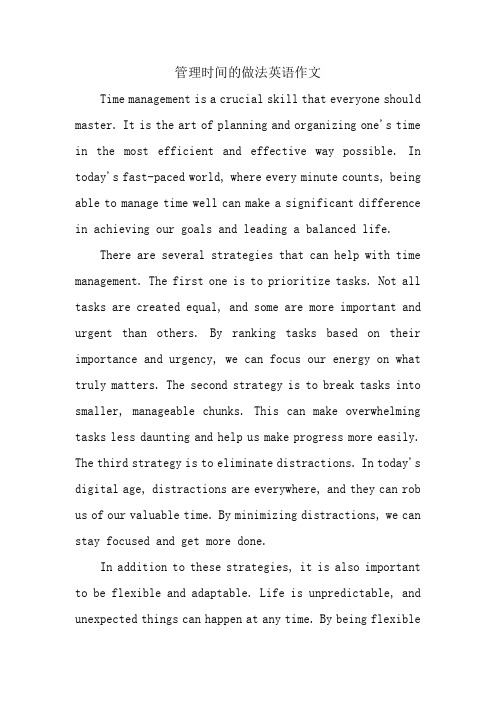
管理时间的做法英语作文Time management is a crucial skill that everyone should master. It is the art of planning and organizing one's time in the most efficient and effective way possible. In today's fast-paced world, where every minute counts, being able to manage time well can make a significant difference in achieving our goals and leading a balanced life.There are several strategies that can help with time management. The first one is to prioritize tasks. Not all tasks are created equal, and some are more important and urgent than others. By ranking tasks based on their importance and urgency, we can focus our energy on what truly matters. The second strategy is to break tasks into smaller, manageable chunks. This can make overwhelming tasks less daunting and help us make progress more easily. The third strategy is to eliminate distractions. In today's digital age, distractions are everywhere, and they can rob us of our valuable time. By minimizing distractions, we can stay focused and get more done.In addition to these strategies, it is also important to be flexible and adaptable. Life is unpredictable, and unexpected things can happen at any time. By being flexibleand open to changes, we can better manage our time and adapt to new situations.In conclusion, time management is an essential skill that can help us achieve our goals and live a more balanced life. By implementing effective strategies and being flexible, we can make the most of our time and accomplish more in less time.中文翻译:时间管理是每个人都应该掌握的关键技能。
offering tips on making time
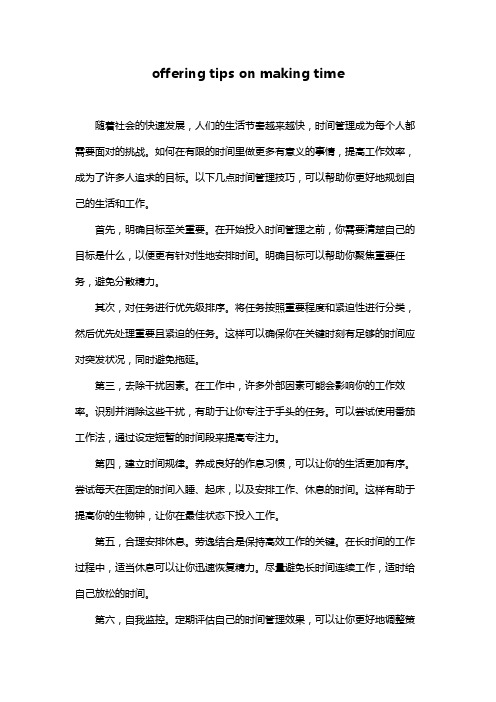
offering tips on making time随着社会的快速发展,人们的生活节奏越来越快,时间管理成为每个人都需要面对的挑战。
如何在有限的时间里做更多有意义的事情,提高工作效率,成为了许多人追求的目标。
以下几点时间管理技巧,可以帮助你更好地规划自己的生活和工作。
首先,明确目标至关重要。
在开始投入时间管理之前,你需要清楚自己的目标是什么,以便更有针对性地安排时间。
明确目标可以帮助你聚焦重要任务,避免分散精力。
其次,对任务进行优先级排序。
将任务按照重要程度和紧迫性进行分类,然后优先处理重要且紧迫的任务。
这样可以确保你在关键时刻有足够的时间应对突发状况,同时避免拖延。
第三,去除干扰因素。
在工作中,许多外部因素可能会影响你的工作效率。
识别并消除这些干扰,有助于让你专注于手头的任务。
可以尝试使用番茄工作法,通过设定短暂的时间段来提高专注力。
第四,建立时间规律。
养成良好的作息习惯,可以让你的生活更加有序。
尝试每天在固定的时间入睡、起床,以及安排工作、休息的时间。
这样有助于提高你的生物钟,让你在最佳状态下投入工作。
第五,合理安排休息。
劳逸结合是保持高效工作的关键。
在长时间的工作过程中,适当休息可以让你迅速恢复精力。
尽量避免长时间连续工作,适时给自己放松的时间。
第六,自我监控。
定期评估自己的时间管理效果,可以让你更好地调整策略。
在评估过程中,找出自己在时间管理上的优点和不足,然后针对性地进行改进。
总之,掌握时间管理技巧,做时间的主人。
通过明确目标、优先级排序、去除干扰、建立时间规律、合理安排休息和自我监控,你可以在繁忙的生活中实现高效工作,享受更加愉悦的生活。
managetime英语作文带翻译
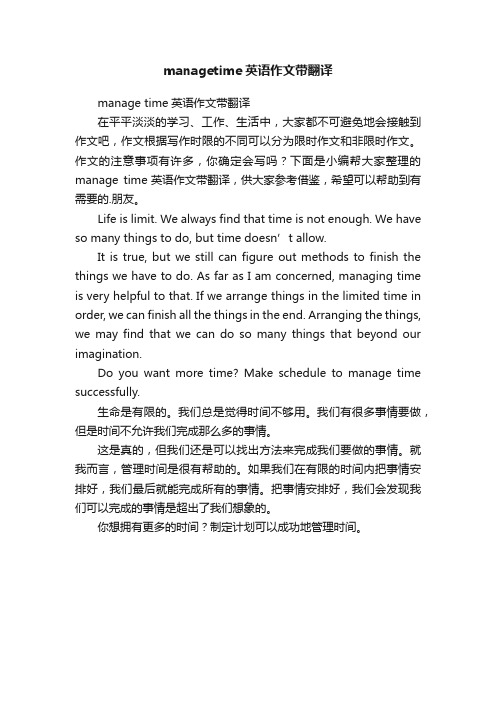
managetime英语作文带翻译manage time英语作文带翻译在平平淡淡的学习、工作、生活中,大家都不可避免地会接触到作文吧,作文根据写作时限的不同可以分为限时作文和非限时作文。
作文的注意事项有许多,你确定会写吗?下面是小编帮大家整理的manage time英语作文带翻译,供大家参考借鉴,希望可以帮助到有需要的.朋友。
Life is limit. We always find that time is not enough. We have so many things to do, but time doesn’t allow.It is true, but we still can figure out methods to finish the things we have to do. As far as I am concerned, managing time is very helpful to that. If we arrange things in the limited time in order, we can finish all the things in the end. Arranging the things, we may find that we can do so many things that beyond our imagination.Do you want more time? Make schedule to manage time successfully.生命是有限的。
我们总是觉得时间不够用。
我们有很多事情要做,但是时间不允许我们完成那么多的事情。
这是真的,但我们还是可以找出方法来完成我们要做的事情。
就我而言,管理时间是很有帮助的。
如果我们在有限的时间内把事情安排好,我们最后就能完成所有的事情。
把事情安排好,我们会发现我们可以完成的事情是超出了我们想象的。
Making-Time-to-Manage
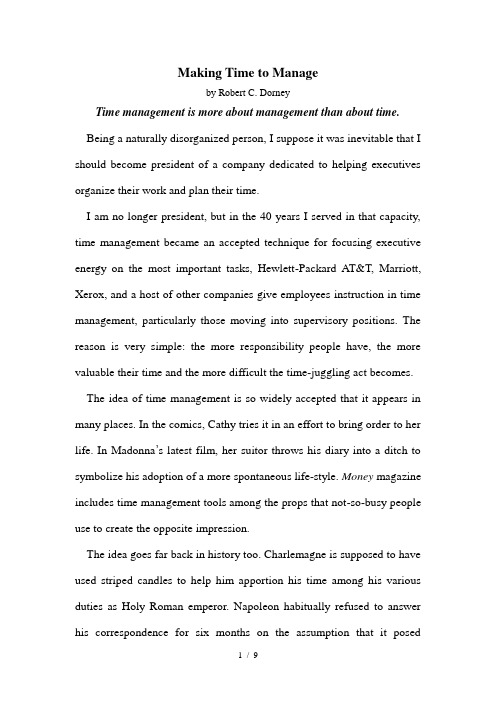
Making Time to Manageby Robert C. DorneyTime management is more about management than about time. Being a naturally disorganized person, I suppose it was inevitable that I should become president of a company dedicated to helping executives organize their work and plan their time.I am no longer president, but in the 40 years I served in that capacity, time management became an accepted technique for focusing executive energy on the most important tasks, Hewlett-Packard AT&T, Marriott, Xerox, and a host of other companies give employees instruction in time management, particularly those moving into supervisory positions. The reason is very simple: the more responsibility people have, the more valuable their time and the more difficult the time-juggling act becomes. The idea of time management is so widely accepted that it appears in many places. In the comics, Cathy tries it in an effort to bring order to her life. In Madonna’s latest film, her suitor throws his diary into a ditch to symbolize his adoption of a more spontaneous life-style. Money magazine includes time management tools among the props that not-so-busy people use to create the opposite impression.The idea goes far back in history too. Charlemagne is supposed to have used striped candles to help him apportion his time among his various duties as Holy Roman emperor. Napoleon habitually refused to answer his correspondence for six months on the assumption that it posedproblems that would go away if he ignored them. Thus he saved himself untold hours solving problems for subordinates.“Time management is a little like statistics,” Stuart Smith, director of management development at Laventhal & Horwath, told me recently. “They’re necessary and good, but only when linked to relevant functions.I find in teaching statistics that students cross the boredom barrier when I cross the relevance threshold. We therefore include time management in our training, but not as a separate discipline. We fold it into our curriculum of management skills. This connects it to the achievement of goals and the ordering of priorities.”Is it possible that some executives scorn time management because they fail to see its relevance? But if the achievement of goals and the ordering of priorities are managerial functions (and who would deny it?), the relevance is clear.The more valuable a person’s time, the more carefully the spending of it needs scrutiny.If asked, very few executives could say how they spend their time. Most know what they ought to be doing; they may even allocate blocks of time to specified tasks. But that’s not the same as getting on with them.I submit a corollary: most people don’t know what their time is worth. It’s simple enough to take your annual salary, add 40% or thereabouts for perks and benefits, and then divide the sum by 2,000 or some other number of hours to come up with an hourly rate. The Exhibitdemonstrates the value-or at least the price-of executive time. Knowledge of the big numbers might encourage some executives to abandon trivial tasks and get on with running the enterprise.On the other hand, it might contribute to stress. An executive might say to herself anxiously, “Am I really worth $168.27 an hour when I’m reading a trade magazine?”The answer is “probably not.”But I doubt that that realization would induce her to spend more time managing (whatever that means) if she were not already so disposed.Focus on the second wordTime management is more about management than about time. Writing everything down in a planner or diary may inspire a feeling of ineffable virtue and even well-being. But if you’re tracking activities you shouldn’t be involved in at all, you aren’t managing your time.Unless you keep records, it’s easy to think you are managing, planning, organizing, and setting goals, when in fact you may be spending most of your hours putting out fires, solving problems for subordinates, or worse, creating problems for your subordinates.In Japan recently, I drove around Tokyo with an extremely successful Japanese businessman. Every time he had an idea, he called his office on his cellular phone. I reflected that he was not only interrupting himself but also creating chaos in his office. That this could happen in Japan, thatexemplar of efficiency and enlightened management, astounded me.As a student of Japanese business and culture, I’m emboldened to dispel my own astonishment: while the Japanese are very efficient in production, very precise in market analysis, and adept in statistical process control, they aren’t very well organized. They make up for this deficiency by working extremely hard-harder, it’s been noted often and with some asperity, than their American counterparts. Their keen interest in and enthusiasm for time management may have severe consequences for our trade deficit if it helps them further boost their efficiency. Balancing actBalancing is the most difficult part of managing one’s own time. What meetings should I attend, which should I skip? Must I read all these reports? Should every important customer have access to my ear? What’s important for me to know firsthand, and what can I delegate to others, is hard to pinpoint.I used to set Saturdays aside for product development, the part of my job I liked most. So I enjoyed working Saturdays until my son started playing football at a university three hours distant. To see him play, I had to leave Friday afternoon. That ended Saturdays devoted to work. I had to rearrange my entire weekly schedule to include product development, and that forced me to analyze where and how I was spending my time.That analysis eventually brought me to place a value on my everyactivity. Some of them justified a valuation several times that of others. While product development justified five times that of others. While product development justified five times my hourly rate, obviously I couldn’t spend all my time on it. What was equally obvious, I had to limit the time I spent on less important work that didn’t merit half my hourly rate.The answer lay in allocating time to the various activities so that when I multiplied the hours devoted to each one by the hourly rate assigned to it, the total would be one that my board of directors and I could live with. Most readers will recognize this as yet another application of Italian economist Vilfredo Pareto’s 80-20 principle. Only instead of applying it to taxation of the “vital few” who pay 80% of the taxes, I apply it to the significant functions that produce 80% or more of the return while still giving the “trivial many” the time they are worth.The arenas I operated in, besides product development, included these: Selecting and training a successor Long-range planning Short-range planning Reviewing budgets Conducting staff meetings Talking with customers Reviewing senior staff performance Delegating Community activities Facilities planning Meeting suppliers Reading mailReading professional journals RecreationI assigned the highest value (5) to those activities that have a direct bearing on the company’s future.They numbered only two: choosing and training my successor, and product development. Now, some might question the president’s deep involvement in product development. And rightly so. But it depends on how important new products are to ensure the company’s continued good health. The criterion I apply is: Can anyone else do it as well? Having settled that question with my usual modesty, I acknowledged that in an ideal world I would find and train a good engineer to direct product development.It is a truism that many chief executives spend much of their time in their previous function. A president out of engineering tends to hang around the engineering department. A president from advertising tends to rewrite copy and fret over layouts-which is exactly where he or she should spend the least amount of time. Having expertise in the field should enable the president to judge the work of that department with dispatch and precision. When an engineer-president reviews engineering, his or her expertise warrants assignment of the highest value to that time. But the instant the president sits down at a CAD terminal, the value drops to the rate paid those engaged in computer-assisted design.And another point: the hourly value of an activity varies inversely with the amount of time spent. The reason is that as an activity takes over a president’s time, it tends to become and end in itself, an activity with littleor no benefit. This applies even to a CEO’s most important responsibility, planning. Plans should be blueprints for action, not a way to fill a bookshelf with impressive binders without issue.Who can do it better?Delegating is the executive’s greatest need as well as greatest privilege. Most of it, of course, should happen automatically. Reviewing a market plan, say, is a function of the marketing vice president, not that person’s boss. The act of delegating rates a value of 3, and that only when applying structure to a totally new responsibility.While marketing clearly bears directly on the compan y’s future, the criterion for CEO involvement is not just importance. The overriding question is: Can someone do the job better? Today, even strategic planning has become a delegated function. Value factors must therefore satisfy both criteria before the chief enters the picture.Which brings me back to balancing. How can you control the demands made on you, the interruptions, the upward delegation, the unwanted invitations? There are ways to limit your involvement. Let me give an example, my name is known to many of our customers because it appears in most of our company literature. So I get myriads of phone calls from customers with suggestions or complaints. A certain amount of time I spend that way, though I assign it a value of 1, is productive. At some point, though, its value benefit vanishes.I have a way to satisfy the customer and spare my time. The technique is less important than the purpose, which is to assign responsibility. When I learn what’s on the customer’s mind, I say, “I want someone else to hear this too.” I dial up a conference call, stay on for a few seconds, and then explain that Ms. So-and-So knows far more about this matter than I do and will take care of it.The question of who can do it better also applies to the time-monitoring task. To focus on things they have identified as having the greatest impact on the future of their companies, many CEOs I have talked to keep detailed records of their daily activities. Some then dictate that record to a secretary or executive assistant. It’s a laborious, boring, and time-consuming task. But they are convinced they have to do it to keep their priorities straight.I’d go a step further. A CEO needs someone of unquestioned loyalty and discretion to monitor his or her activities against the template of differential values. I see two advantages to this tactic: it relieves the chief of the bothersome task of logging time and it offers the CEO a more detached view of how well the objective is being met.While most companies have stated priorities and goals, it’s a common lament that they are not consistently addressed. They become mere articles of faith, often repeated but not vigorously pursued.Placing higher values on those activities that serve stated priorities andpromise to achieve stated goals provides a means of measuring executive performance. Executives who consistently ask themselves, “Did I earn my salary today?”and have developed a quantitative method for answering that question should have the motivation necessary to make sure it is answered affirmatively.EXHIBIT What Is the Price of Executive Time?BenefitsAnnual Weekly (40% of Total Value/ Value/ Salary Salary Weekly Salary) Week Hour* Minute$ 50,000 $ 961.54 $ 384.62 $ 1,346.16 $ 33.65 $ 0.56 60,000 1,153.85 461.54 1,615.39 40.38 0.6775,000 1,442.31 576.93 2,019.24 50.48 0.84 100,000 1,923.08 769.23 2,692.31 67.31 1.12 250,000 4,807.70 1,923.08 6,730.78 168.27 2.80*40-hour weekNote: Robert C. Dorney:Associated since 1947 with Day-Timers, Inc., a producer of self-organization systems for managers, Robert C. Dorney was president until early in 1987, when he stepped down to become senior vice president and director of product development. In 1972, Day-Timers was acquired by Beatrice Companies, then became part of E-II Holdings Inc. when that corporation was formed in 1986.。
时间管理英语讲解

时间管理英语讲解时间管理是一项重要的技能,在现代生活中尤为关键。
有效地管理时间可以使我们更加高效地完成任务,减少压力,并提高生活质量。
本文将为您介绍一些与时间管理相关的英语表达和技巧。
1. 词汇在讨论时间管理时,以下一些词汇和短语经常被使用:•Time management: 时间管理•Prioritize: 给予优先•Procrastination: 拖延•Deadline: 截止日期•Productivity: 生产力•Time-consuming: 耗费时间的•Multitasking: 多任务处理•Efficiency: 效率•Time frame: 时间框架•Time-sensitive: 时间敏感的2. 重要性时间管理对于个人和职业发展来说都至关重要。
它有助于我们合理分配时间,设定目标并持续不断地努力追求。
在工作领域,时间管理可以帮助我们避免拖延,并按时完成任务。
在生活领域,它可以使我们更好地平衡工作和个人生活,并提高生活质量。
3. 时间管理技巧下面是一些常用的时间管理技巧,可以帮助您更好地管理时间:3.1 制定清晰的目标设定明确的目标是高效时间管理的基础。
确保您知道自己想要实现的目标,并将其分解成可操作的任务。
有明确的目标可以帮助您更好地计划和管理时间。
3.2 制定优先级在时间有限的情况下,我们需要学会给予任务优先级。
将任务分为重要和紧急,然后根据其重要性和紧急程度进行安排。
这样可以确保您首先完成最重要和紧急的任务。
3.3 避免拖延拖延是时间管理的大敌。
为了避免拖延,尝试使用一些方法,例如将任务分解成小的可管理的步骤,设定截止日期,并采取积极主动的态度。
3.4 多任务处理的时间多任务处理是一项常见的技巧,但它并不适用于所有人。
有些人在多任务处理时效率更高,而另一些人则更喜欢一次专注于一项任务。
了解自己的工作风格,并根据自己的喜好选择最合适的方法。
3.5 计划和时间框架为了更好地管理时间,制定一个日程计划是非常重要的。
- 1、下载文档前请自行甄别文档内容的完整性,平台不提供额外的编辑、内容补充、找答案等附加服务。
- 2、"仅部分预览"的文档,不可在线预览部分如存在完整性等问题,可反馈申请退款(可完整预览的文档不适用该条件!)。
- 3、如文档侵犯您的权益,请联系客服反馈,我们会尽快为您处理(人工客服工作时间:9:00-18:30)。
Making Time to Manageby Robert C. DorneyTime management is more about management than about time. Being a naturally disorganized person, I suppose it was inevitable that I should become president of a company dedicated to helping executives organize their work and plan their time.I am no longer president, but in the 40 years I served in that capacity, time management became an accepted technique for focusing executive energy on the most important tasks, Hewlett-Packard AT&T, Marriott, Xerox, and a host of other companies give employees instruction in time management, particularly those moving into supervisory positions. The reason is very simple: the more responsibility people have, the more valuable their time and the more difficult the time-juggling act becomes. The idea of time management is so widely accepted that it appears in many places. In the comics, Cathy tries it in an effort to bring order to her life. In Madonna’s latest film, her suitor throws his diary into a ditch to symbolize his adoption of a more spontaneous life-style. Money magazine includes time management tools among the props that not-so-busy people use to create the opposite impression.The idea goes far back in history too. Charlemagne is supposed to have used striped candles to help him apportion his time among his various duties as Holy Roman emperor. Napoleon habitually refused to answer his correspondence for six months on the assumption that it posedproblems that would go away if he ignored them. Thus he saved himself untold hours solving problems for subordinates.“Time management is a little like statistics,” Stuart Smith, director of management development at Laventhal & Horwath, told me recently. “They’re necessary and good, but only when linked to relevant functions.I find in teaching statistics that students cross the boredom barrier when I cross the relevance threshold. We therefore include time management in our training, but not as a separate discipline. We fold it into our curriculum of management skills. This connects it to the achievement of goals and the ordering of priorities.”Is it possible that some executives scorn time management because they fail to see its relevance? But if the achievement of goals and the ordering of priorities are managerial functions (and who would deny it?), the relevance is clear. The more valuable a person’s time, the more carefully the spending of it needs scrutiny.If asked, very few executives could say how they spend their time. Most know what they ought to be doing; they may even allocate blocks of time to specified tasks. But that’s not the same as getting on with them.I submit a corollary: most people don’t know what their time is worth. It’s simple enough to take your annual salary, add 40% or thereabouts for perks and benefits, and then divide the sum by 2,000 or some other number of hours to come up with an hourly rate. The Exhibitdemonstrates the value-or at least the price-of executive time. Knowledge of the big numbers might encourage some executives to abandon trivial tasks and get on with running the enterprise.On the other hand, it might contribute to stress. An executive might say to herself anxiously, “Am I really worth $168.27 an hour when I’m reading a trade magazine?”The answer is “probably not.”But I doubt that that realization would induce her to spend more time managing (whatever that means) if she were not already so disposed.Focus on the second wordTime management is more about management than about time. Writing everything down in a planner or diary may inspire a feeling of ineffable virtue and even well-being. But if you’re tracking activities you shouldn’t be involved in at all, you aren’t managing your time.Unless you keep records, it’s easy to think you are managing, planning, organizing, and setting goals, when in fact you may be spending most of your hours putting out fires, solving problems for subordinates, or worse, creating problems for your subordinates.In Japan recently, I drove around Tokyo with an extremely successful Japanese businessman. Every time he had an idea, he called his office on his cellular phone. I reflected that he was not only interrupting himself but also creating chaos in his office. That this could happen in Japan, thatexemplar of efficiency and enlightened management, astounded me.As a student of Japanese business and culture, I’m emboldened to dispel my own astonishment: while the Japanese are very efficient in production, very precise in market analysis, and adept in statistical process control, they aren’t very well organized. They make up for this deficiency by working extremely hard-harder, it’s been noted often and with some asperity, than their American counterparts. Their keen interest in and enthusiasm for time management may have severe consequences for our trade deficit if it helps them further boost their efficiency. Balancing actBalancing is the most difficult part of managing one’s own time. What meetings should I attend, which should I skip? Must I read all these reports? Should every important customer have access to my ear? What’s important for me to know firsthand, and what can I delegate to others, is hard to pinpoint.I used to set Saturdays aside for product development, the part of my job I liked most. So I enjoyed working Saturdays until my son started playing football at a university three hours distant. To see him play, I had to leave Friday afternoon. That ended Saturdays devoted to work. I had to rearrange my entire weekly schedule to include product development, and that forced me to analyze where and how I was spending my time.That analysis eventually brought me to place a value on my everyactivity. Some of them justified a valuation several times that of others. While product development justified five times that of others. While product development justified five times my hourly rate, obviously I couldn’t spend all my time on it. What was equally obvious, I had to limit the time I spent on less important work that didn’t merit half my hourly rate.The answer lay in allocating time to the various activities so that when I multiplied the hours devoted to each one by the hourly rate assigned to it, the total would be one that my board of directors and I could live with. Most readers will recognize this as yet another application of Italian economist Vilfredo Pareto’s 80-20 principle. Only instead of applying it to taxation of the “vital few” who pay 80% of the taxes, I apply it to the significant functions that produce 80% or more of the return while still giving the “trivial many” the time they are worth.The arenas I operated in, besides product development, included these: Selecting and training a successor Long-range planning Short-range planning Reviewing budgets Conducting staff meetings Talking with customers Reviewing senior staff performance Delegating Community activities Facilities planning Meeting suppliers Reading mailReading professional journals RecreationI assigned the highest value (5) to those activities that have a direct bearing on the company’s future. They numbered only two: choosing and training my successor, and product development. Now, some might question the president’s deep involvement in product development. And rightly so. But it depends on how important new products are to ensure the company’s continued good health. The criterion I apply is: Can anyone else do it as well? Having settled that question with my usual modesty, I acknowledged that in an ideal world I would find and train a good engineer to direct product development.It is a truism that many chief executives spend much of their time in their previous function. A president out of engineering tends to hang around the engineering department. A president from advertising tends to rewrite copy and fret over layouts-which is exactly where he or she should spend the least amount of time. Having expertise in the field should enable the president to judge the work of that department with dispatch and precision. When an engineer-president reviews engineering, his or her expertise warrants assignment of the highest value to that time. But the instant the president sits down at a CAD terminal, the value drops to the rate paid those engaged in computer-assisted design.And another point: the hourly value of an activity varies inversely with the amount of time spent. The reason is that as an activity takes over a president’s time, it tends to become and end in itself, an activity with littleor no benefit. This applies even to a CEO’s most important responsibility, planning. Plans should be blueprints for action, not a way to fill a bookshelf with impressive binders without issue.Who can do it better?Delegating is the executive’s greatest need as well as greatest privilege. Most of it, of course, should happen automatically. Reviewing a market plan, say, is a function of the marketing vice president, not that person’s boss. The act of delegating rates a value of 3, and that only when applying structure to a totally new responsibility.While marketing clearly bears directly on the compan y’s future, the criterion for CEO involvement is not just importance. The overriding question is: Can someone do the job better? Today, even strategic planning has become a delegated function. Value factors must therefore satisfy both criteria before the chief enters the picture.Which brings me back to balancing. How can you control the demands made on you, the interruptions, the upward delegation, the unwanted invitations? There are ways to limit your involvement. Let me give an example, my name is known to many of our customers because it appears in most of our company literature. So I get myriads of phone calls from customers with suggestions or complaints. A certain amount of time I spend that way, though I assign it a value of 1, is productive. At some point, though, its value benefit vanishes.I have a way to satisfy the customer and spare my time. The technique is less important than the purpose, which is to assign responsibility. When I learn what’s on the customer’s mind, I say, “I want someone else to hear this too.” I dial up a conference call, stay on for a few seconds, and then explain that Ms. So-and-So knows far more about this matter than I do and will take care of it.The question of who can do it better also applies to the time-monitoring task. To focus on things they have identified as having the greatest impact on the future of their companies, many CEOs I have talked to keep detailed records of their daily activities. Some then dictate that record to a secretary or executive assistant. It’s a laborious, boring, and time-consuming task. But they are convinced they have to do it to keep their priorities straight.I’d go a step further. A CEO needs someone of unquestioned loyalty and discretion to monitor his or her activities against the template of differential values. I see two advantages to this tactic: it relieves the chief of the bothersome task of logging time and it offers the CEO a more detached view of how well the objective is being met.While most companies have stated priorities and goals, it’s a common lament that they are not consistently addressed. They become mere articles of faith, often repeated but not vigorously pursued.Placing higher values on those activities that serve stated priorities andpromise to achieve stated goals provides a means of measuring executive performance. Executives who consistently ask themselves, “Did I earn my salary today?”and have developed a quantitative method for answering that question should have the motivation necessary to make sure it is answered affirmatively.EXHIBIT What Is the Price of Executive Time?BenefitsAnnual Weekly (40% of Total Value/ Value/ Salary Salary Weekly Salary) Week Hour* Minute$ 50,000 $ 961.54 $ 384.62 $ 1,346.16 $ 33.65 $ 0.56 60,000 1,153.85 461.54 1,615.39 40.38 0.6775,000 1,442.31 576.93 2,019.24 50.48 0.84 100,000 1,923.08 769.23 2,692.31 67.31 1.12 250,000 4,807.70 1,923.08 6,730.78 168.27 2.80*40-hour weekNote: Robert C. Dorney:Associated since 1947 with Day-Timers, Inc., a producer of self-organization systems for managers, Robert C. Dorney was president until early in 1987, when he stepped down to become senior vice president and director of product development. In 1972, Day-Timers was acquired by Beatrice Companies, then became part of E-II Holdings Inc. when that corporation was formed in 1986.。
